Clinton, Massachusetts, opened its Shrine of Mary, Mother of Persecuted Christians last week, featuring an Iraqi-painted icon of the Virgin Mary open to all who wish to come and pray for Christians facing death, torture, exile, and other hardships as a result of their faith.
Speaking to Breitbart News this week, Father Benedict Kiely – who has spearheaded efforts to open similar shrines throughout the West dedicated to Christian victims of persecution and martyrs of the present day – emphasized that Americans and others living as Christians freely “should not feel useless or helpless” when faced with the harrowing stories of those living under Islamist theocracies in the Middle East or facing the horrific genocidal campaigns by groups such as the Islamic State.
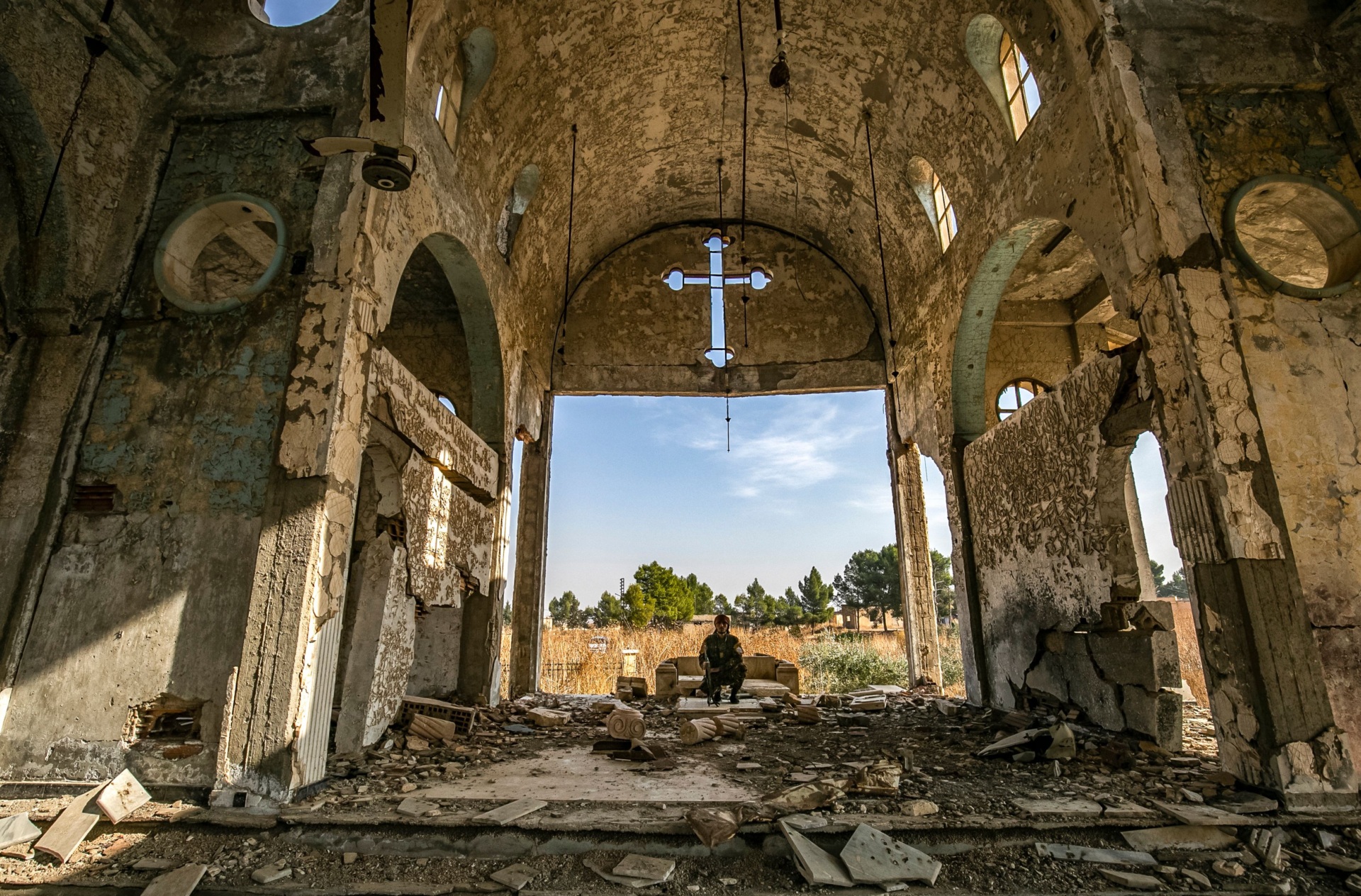
The ruins of the Assyrian Church of the Virgin Mary, which was destroyed by Islamic State jihadists, in the village of Tal Nasri in Syria’s northeastern Hasakah province on November 15, 2019. (DELIL SOULEIMAN/AFP via Getty Images)
“Whenever I’ve been in Iraq, Syria, Lebanon – or spoken to Christians from other persecuted regions – the very first thing they always ask for is that we would pray for them,” Kiely observed to Breitbart News. To aid those efforts, he has connected American and British Catholic communities with the persecuted of those regions through the establishment of shrines intended to focus the prayers of Western Christians towards their persecuted fellow believers.
The first such shrine, the Our Lady of Aradin Shrine in New York City, opened in 2018 in Manhattan’s St. Michael’s Church and features artwork depicting the Virgin Mary and a child Jesus Christ created by Mouthana Butres, a Christian artist from Qaraqosh, Iraq. Qaraqosh was once one of the most populous Christian communities in Iraq before the Islamic State captured it in 2014. The terrorist group was defeated there in November 2016, but much of the city remains in ruins.
In London, Kiely’s work resulted in the establishment of the shrine of Mary, Mother of Persecuted Christians, at the Ordinariate Church of Our Lady of the Assumption and St. Gregory last month. The icon of Mary, featuring an inscription in Aramaic, in London is the work of Lebanese nun Sister Souraya, arriving in London by way of Beirut.
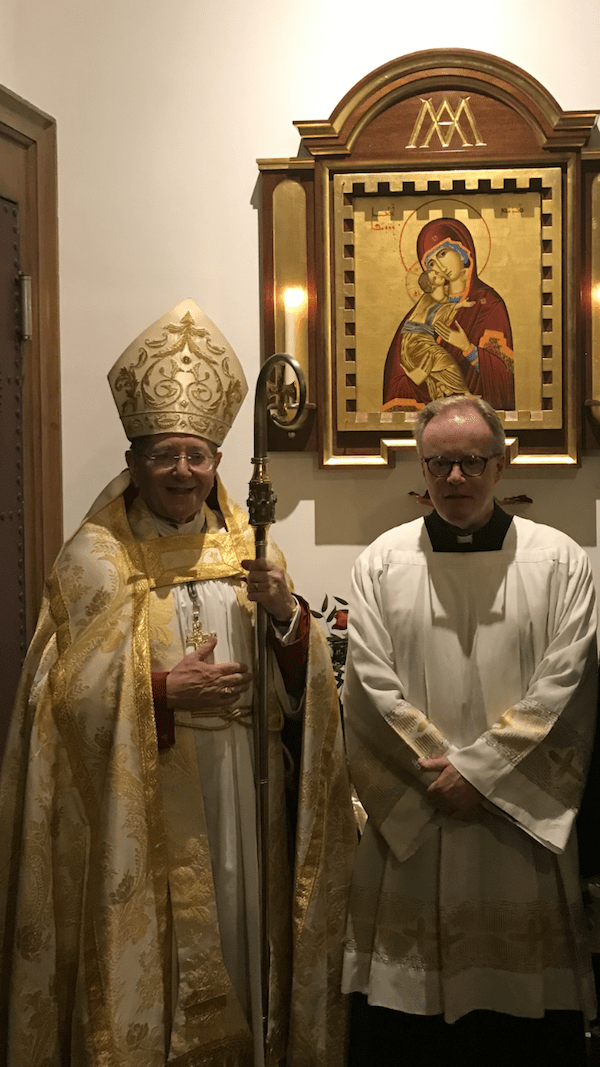
Fr. Benedict Kiely and Monsignor Keith Newton in front of the Shrine for persecuted Christians in London (Courtesy Fr. Kiely)
Syriac Catholic Deacon Ebrahim Lallo of Bardella, Iraq – part of the greater northern Iraqi Nineveh Plains region that the Islamic State devastated in the latter half of the last decade – painted the icon for the shrine in Clinton, Massachusetts.
Deacon Ebrahim Lallo, with icon he painted for the Shrine in Clinton, MA. Picture taken in Bartella, Iraq, December 2021. (Courtesy Fr. Benedict Kiely)
Beautiful, solemn celebration of the Mass for Persecuted Christians and installation of the Shrine in Clinton, MA last night. Thanks to all involved!
Posted by Nasarean.Org on Saturday, October 22, 2022
The project is an outgrowth of Kiely’s Nasarean.org, which is dedicated to helping Christians maintain homes and businesses in their ancestral homeland. Founded in 2016, Nasarean.org focuses on offering “micro-financing to create small businesses” in the former Christian strongholds of Iraq and Syria.
“These include in Iraq a taxi business, a cake/bakery shop, a small furniture business, a chicken farm and a shop for women’s goods,” the project’s website explains. “In Syria – specifically in Damascus, we have been able to help several families start small food and vegetable shops. We have just begun helping some small businesses in Beirut, Lebanon, including a gym and a bakery and we are looking at expanding very soon.”
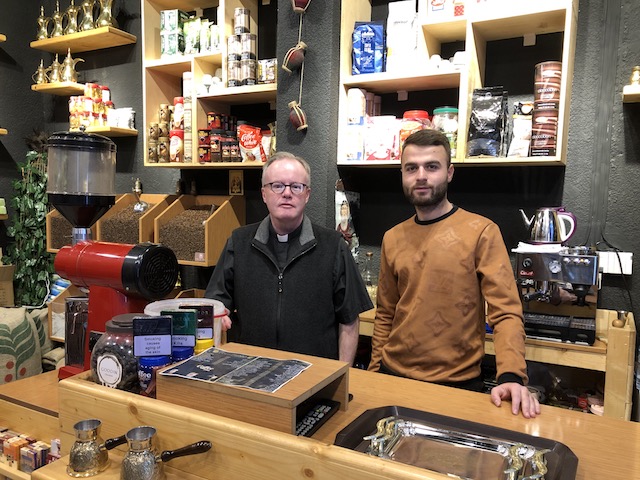
Fr. Benedict Kiely with one of the businesses Nasarean.org supports – a coffee shop in Bartella, Iraq (Courtesy Fr. Kiely)
Kiely told Breitbart News that his work in advocating for and aiding persecuted Christians led him to develop relationship with Catholic leaders there, including the artists of some of the shrines, and to work on helping connect those communities to Christians in freedom in America and elsewhere.
“My ministry as a priest is full-time aid and advocacy for persecuted Christians. It’s why I’ve been to Iraq eight times since early 2015–I’ll be there again in December–and Syria and Lebanon,” Kiely explained. “My ministry is to preach, write, do media – anything to raise awareness. Our aid is very specific – to mini micro-finance small family businesses for persecuted Christians – so they stay in their own countries – have the dignity of running a business – and then employ others.”
Kiely met Deacon Lallo through his visits to Bartella and requested his help in painting the icon for the Massachusetts shrine, he explained.
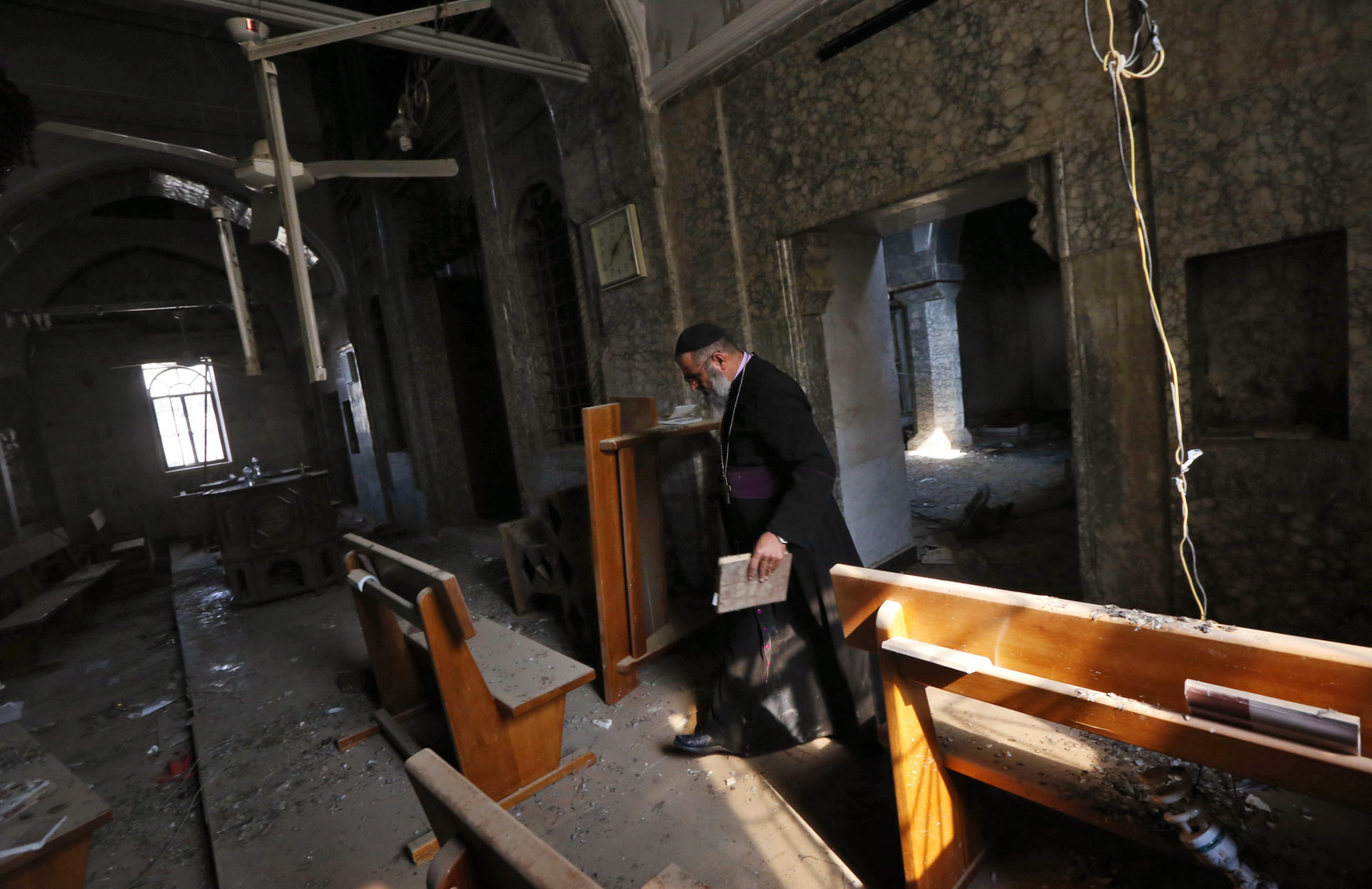
David Dosha, the priest of the Church of Mart Shmony, located in the Christian Iraqi town of Bartella, inspects the damage to the church’s compound after Iraqi forces retook control of the town from Islamic State jihadists on October 24, 2016. (SAFIN HAMED/AFP via Getty Images)
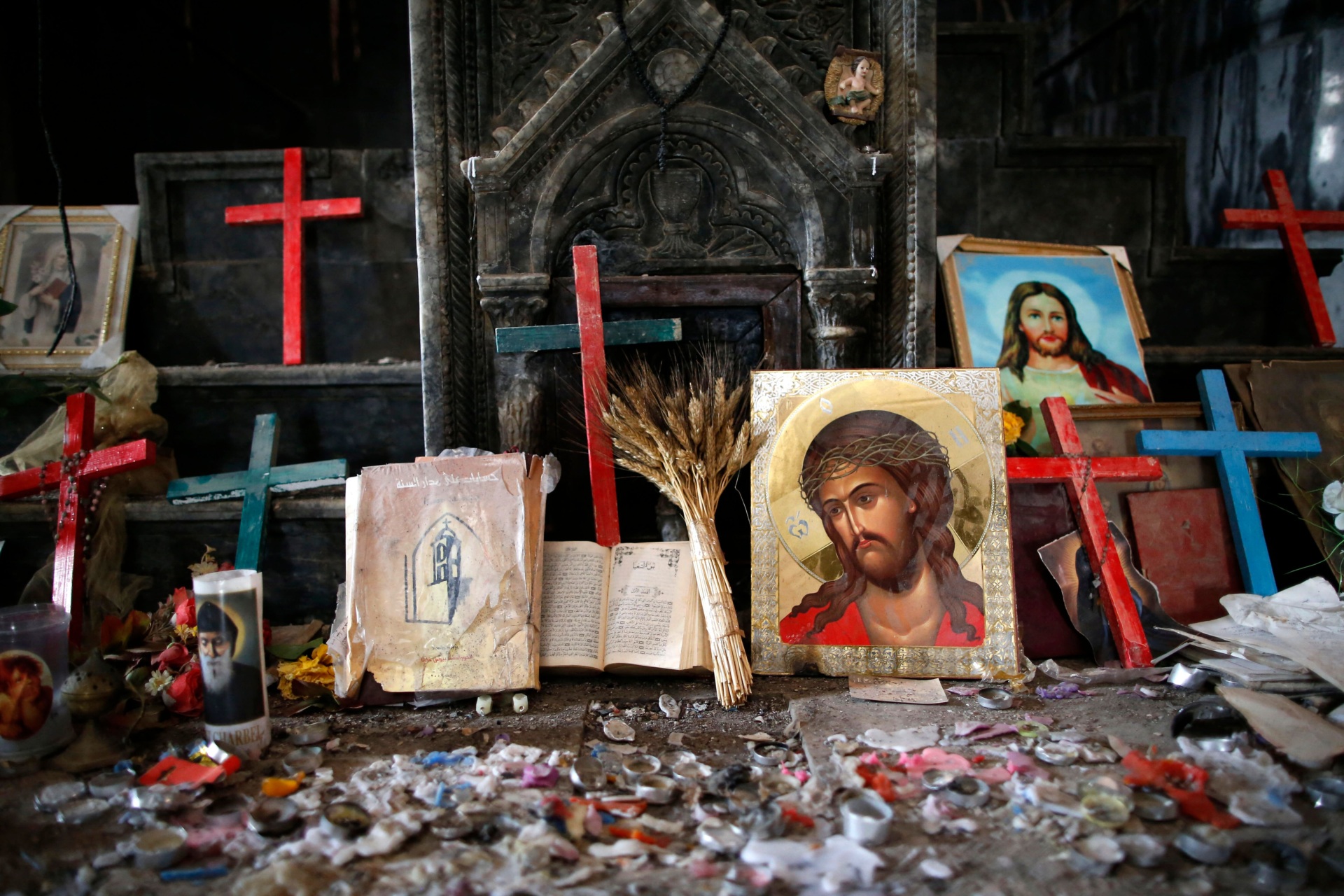
Crucifixes and icons are seen at the heavily damaged Church of the Immaculate Conception in Qaraqosh, some 30 kilometres east of Mosul, Iraq, on April 9, 2017, as Christians mark the first Palm Sunday event in the town since Iraqi forces recaptured it from Islamic State jihadists. (AHMAD GHARABLI/AFP via Getty Images)
“The icon in Clinton was painted by an Iraqi Catholic Deacon who had been driven out of his town – Bartella, on the Nineveh Plain, by ISIS in 2014 – he has returned and I was there last December and asked him to do the icon,” Kieley said. “I’ve been to Bartella several times – apart from the fact that ISIS is reviving – they are now surrounded by Iranian-backed Shia militia[s] who, while not actually killing Christians – are trying to drive them out of their homes and businesses.”
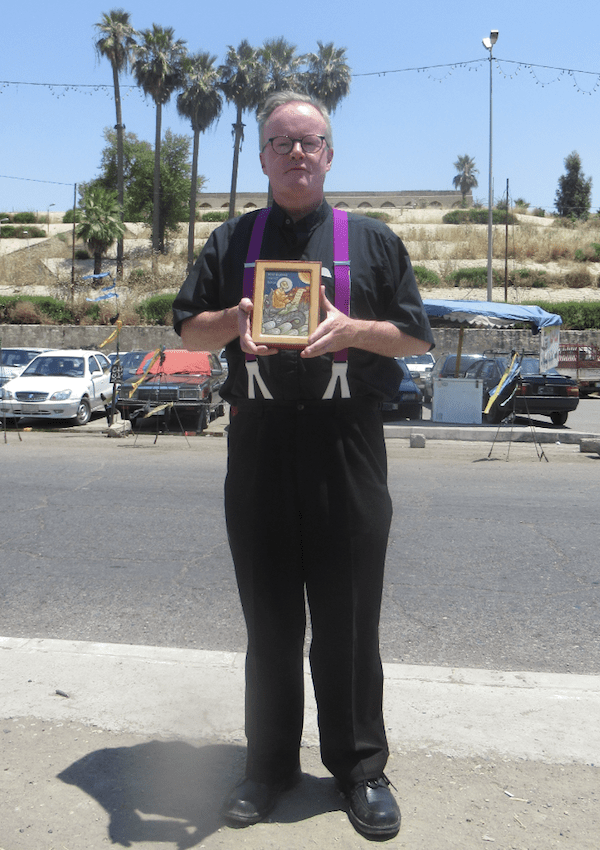
Fr. Benedict Kiely standing in front of the tomb of Jonah the Prophet, which ISIS blew up, in Mosul, Iraq, July 2019 (Courtesy Fr. Kiely)
The Shia militias are collectively known as the Popular Mobilization Forces (PMF) and feature known terrorist organizations such as Asaib Ahl al-Haq (AAH) and the Hezbollah Brigades. They rose to prominence fighting the Islamic State when the Iraqi military had all but collapsed, earning them recognition as a formal wing of the Iraqi armed forces. Since the Islamic State’s “caliphate” in the country collapsed, the PMF has focused on fighting Christians and Kurds who were formally allies in the war against the Sunni ISIS organization. More recently, the PMF has faced opposition from groups associated with nationalist Shiite cleric Muqtada al-Sadr, who opposes Iranian meddling in the country.
The location of the shrines, Kiely explained to Breitbart News, is essentially dictated by finding dioceses receptive to the idea.
“I’m putting shrines in dioceses where the Bishop supports a place of prayer for persecuted Christians,” he said, “so the Bishop of Worcester, [Massachusetts], Bishop Robert McManus, supported the idea and we installed the shrine last Friday and anyone can come and pray and visit – like in London and NYC.”
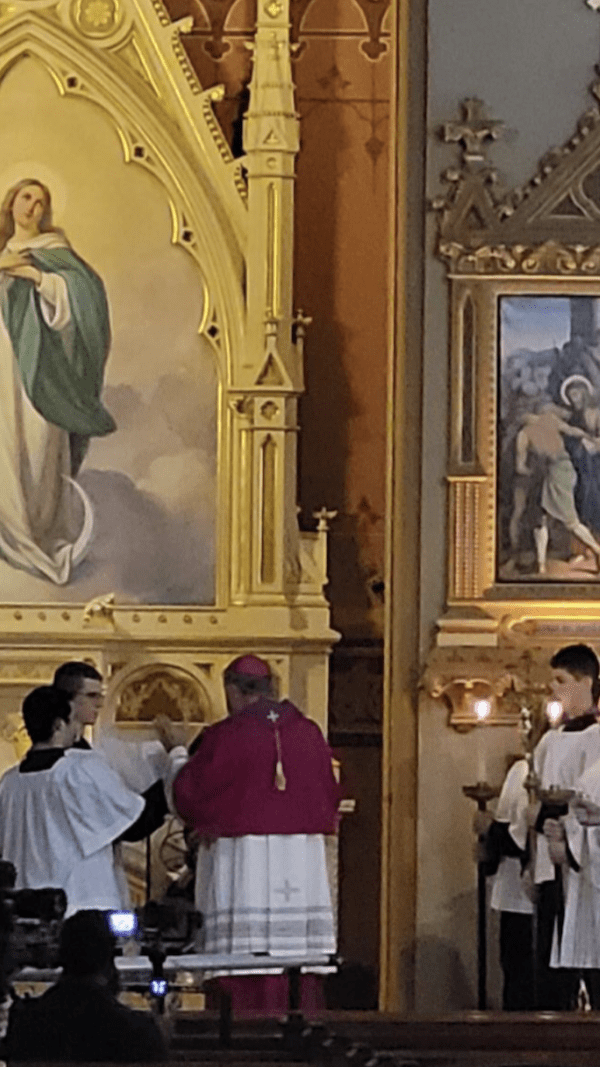
Bishop Robert McManus of Worcester, MA, praying at the shrine blessing in Clinton, MA, on October 21, 2022. (Courtesy Fr. Kiely)
“It is very important that we have the blessing of the local Bishop,” he added. “It shows these are ‘official’ shrines, and it shows the importance the bishop gives to constant and consistent prayer for persecuted Christians all over the world.”
Kiely emphasized the urgency of praying for persecuted Christians, even in light of the demise of the Islamic State. To the extent that Christian persecution has fallen in places like Iraq, reports indicate that only the dramatic decline in local Christian populations is fueling that trend. The Catholic charity Aid to the Church in Need estimated in 2019 that Iraq had lost over 90 percent of its Christians in the ISIS siege; Mosul, the nation’s second-largest city, lost as many as 99 percent of its Christians. In Syria, local Christian leaders estimated last year that the country lost about 66 percent of its Christian population between 2011 and 2021.
“It’s something of a myth that ISIS has been defeated,” Kieley said. “Certainly the ‘caliphate’ based in Mosul and Raqqa has been defeated, but ISIS and it’s affiliates – jihadist extremism – is growing exponentially around the world, especially in Africa.”
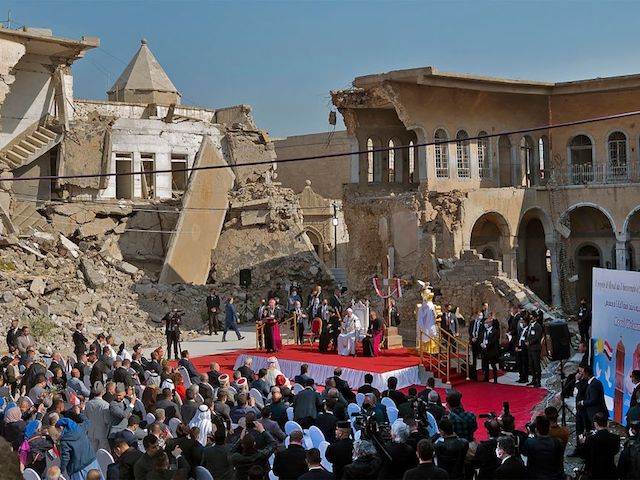
Pope Francis speaks at a square near the ruins of the Syriac Catholic Church of the Immaculate Conception (al-Tahira-l-Kubra), in the old city of Iraq’s northern Mosul on March 7, 2021. (VINCENZO PINTO/AFP via Getty Images)
“This year alone more than 3,000+ Christians have been slaughtered in Nigeria,” he continued. “Christians are being killed in Mail, Niger, Mozambique … jihadists are still controlling sections of Syria and they are still around in Iraq.”
Open Doors, a Christian aid group that documents persecution globally, estimated in January that 360 million Christians around the world are living under “high” levels of persecution. It ranked Taliban-ruled Afghanistan the world’s most dangerous place to be a Christian in its annual World Watch List this year, following by North Korea, the previous holder of the top position for two decades. Iraq and Syria were ranked 14 and 15, respectively, most dangerous, still facing alarming rates of persecution but falling in rank due to the alarming and deteriorating situations in countries such as Nigeria, Libya, Somalia, Eritrea, and Yemen.
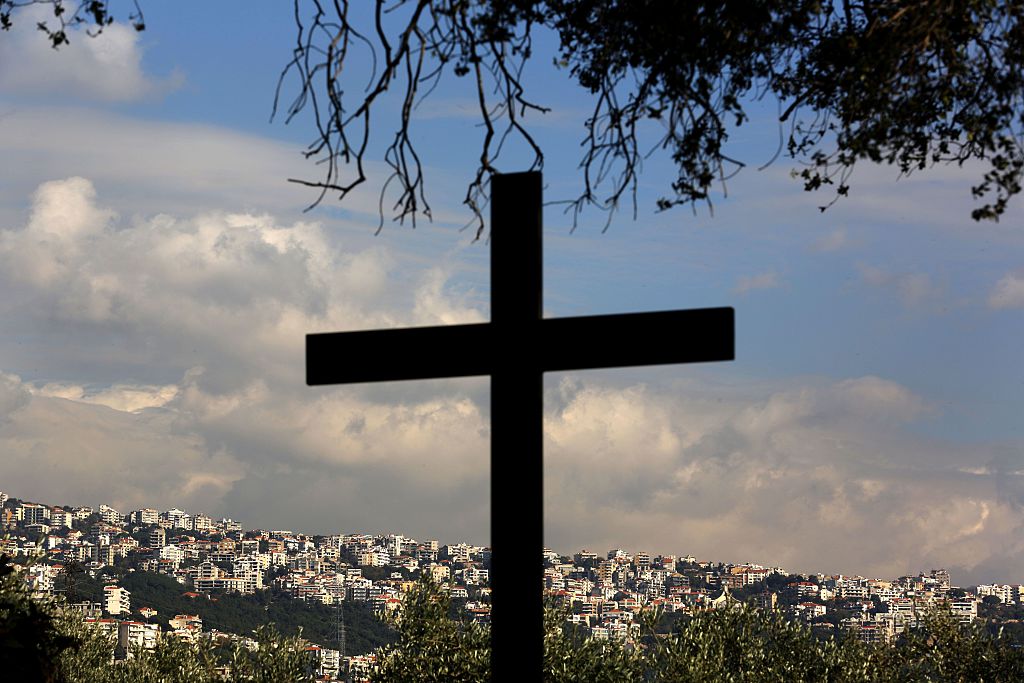
The town of Ajaltoun is seen behind a cross at the Lebanese Maronite Catholic Church of Saint Elias, near the town of Zouk Mosbeh, northeast of Lebanon’s capital Beirut, on December 30, 2015. (PATRICK BAZ/AFP via Getty Images)
Kiely also made a note of the outrageous levels of Christian persecution under the Communist Party of China, “one of the most evil regimes in the world.” While Christianity and Catholicism, treated as separate religions, are “legal” in China, only worship under the direct oversight of Party officials is permitted. Christians who chose to pray in private or establish independent churches face arrests, disappearances into the brutal Chinese penal system, and, in some cases, death. Chinese authorities famously murdered Ding Cuimei, the wife of a local pastor, with a bulldozer while attempting to protect her church in Henan province in 2017.
“People might think the persecution of Christians has ‘died down/disappeared,'” Kiely said, “that’s only because it’s not being covered by the [mainstream media]. I state the case again of Nigeria – this massive slaughter – if it was another religious group other than Christians, would be getting massive media attention.”
“So for Christians, believers, all who cherish religious freedom and liberty – the sort of work we are doing – the shrines, the advocacy and the aid, needs support and encouragement – and prayer is critical!” he said.
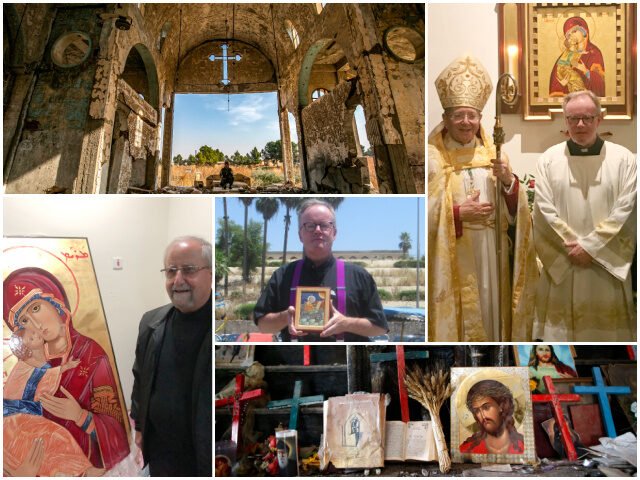
COMMENTS
Please let us know if you're having issues with commenting.